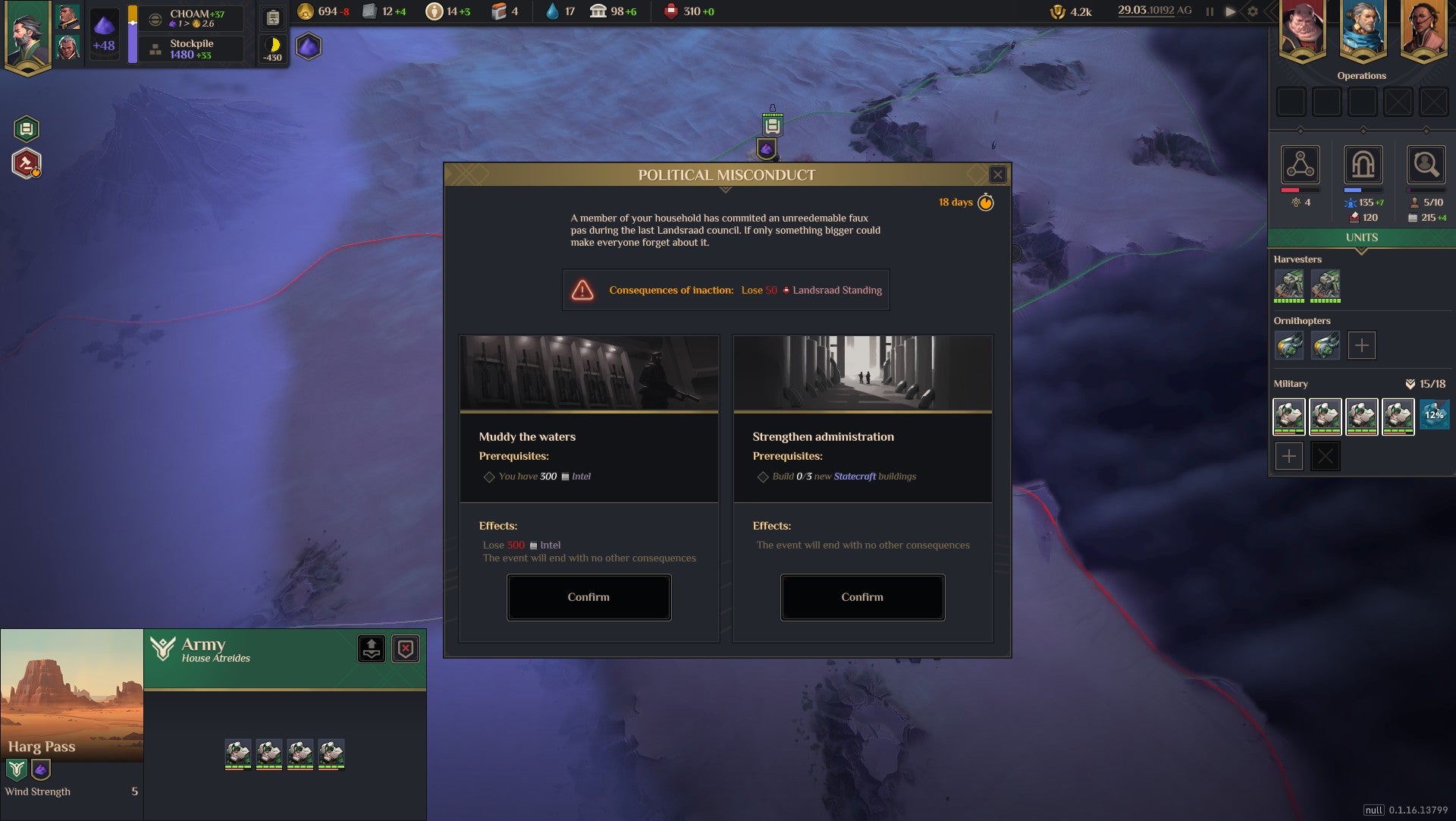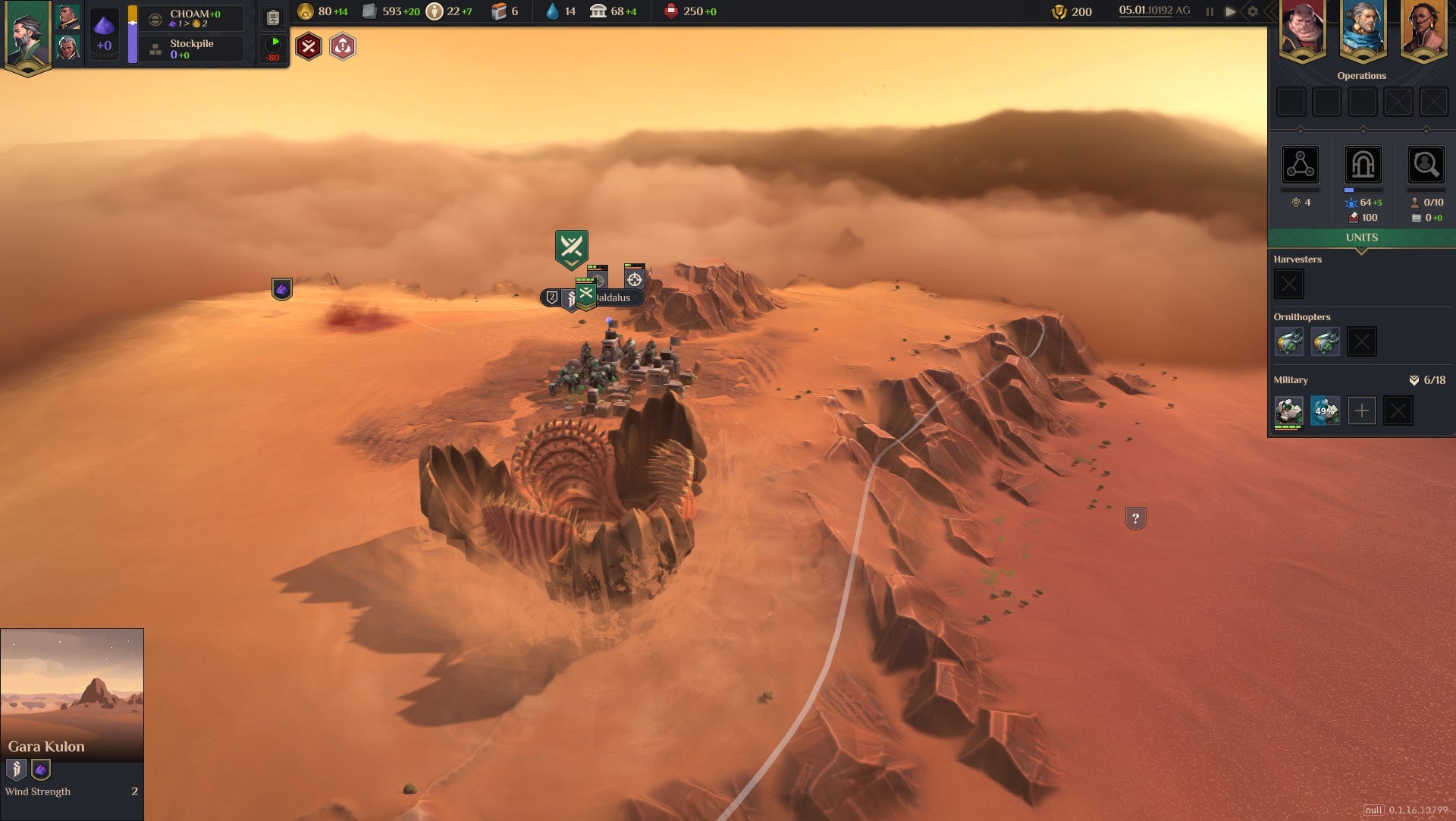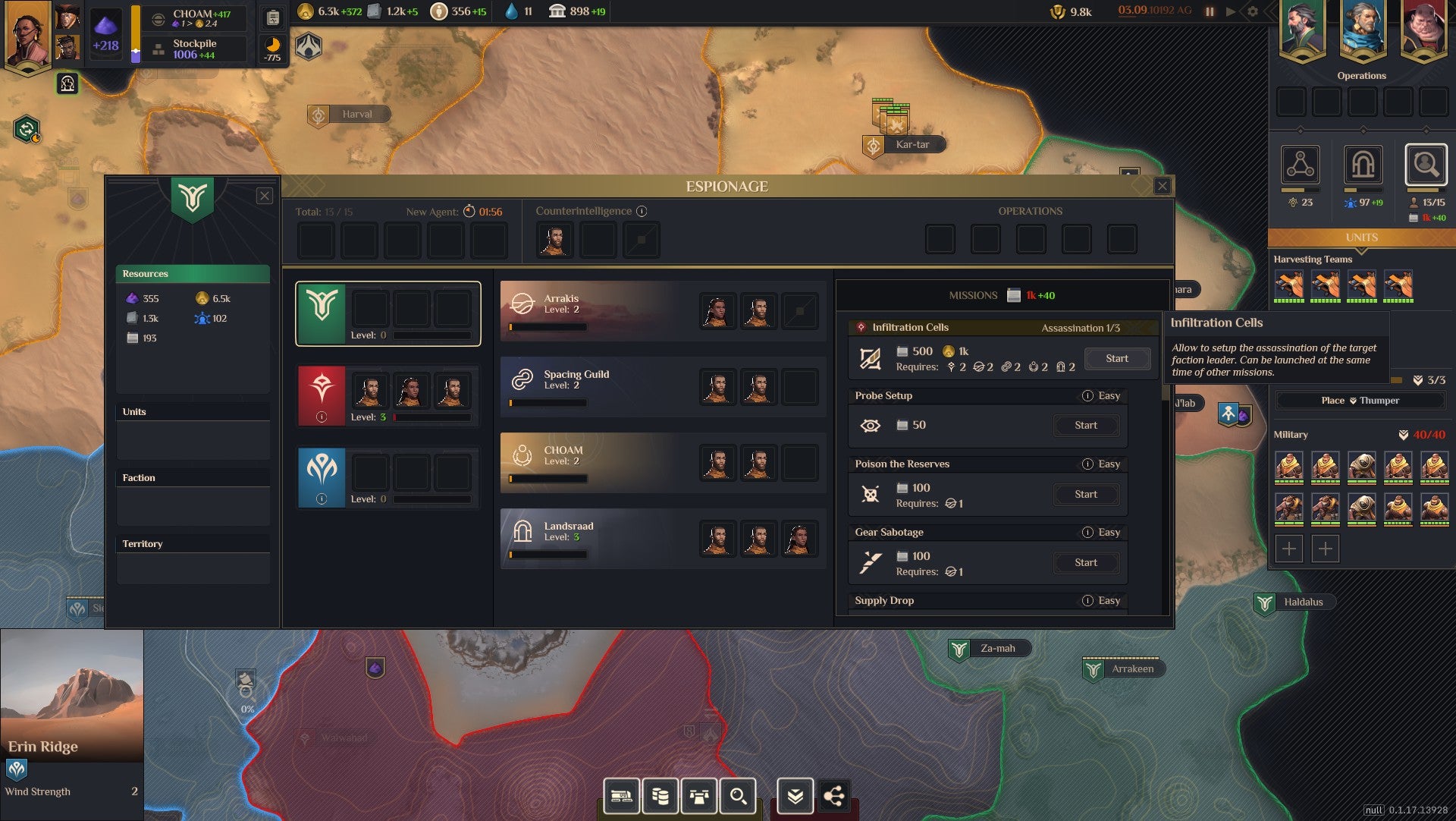Last year graced us with the excellent Slipways, and I’m aware some were left unsated by its puzzler-leaning play, still yearning for the fabled 4X-lite. Stupendous news, those people: once Spice Wars clicks, you can pop a victory screen in four hours. Perhaps less if, unlike me, you can avoid feeding expensive troops to hungry sandworms (i.e The Dickhead’s Gambit). And happy days everyone else, because this brevity doesn’t sacrifice both systems-rich and setting-faithful design. Every political or ecological factor on Arrakis is given due TLC, from trading water with Sietches to prevent raids, to bribing the spacing guild with regular spice shipments. Not everything is equally impactful, but they all converge in an engaging melange of Dune-flavoured decision making. Early access brings four factions. First, there’s Leto Atreides, for people who cut their plain toast into triangles and eat it on the way to parish council meetings. Ever the diplomat, Leto can expand through peaceful annexation. It’s comparatively slow and costly, but prevents the need to spread your military out too thinly, lending Leto’s campaign a ready fist behind the velvet glove. There’s the Baron Harkonnen, for reprobates who slather their toast in marmalade and eat it in the bath. The Harkonnens can use a resource called manpower, usually used for recruitment, to oppress owned villages for a boost in resource output. This increases unrest, potentially leading to rebellions, but can otherwise make you disgustingly rich, disgustingly quickly. There’s the Smugglers, who don’t care about toast until you make some, and suddenly they really fancy a slice. They can install underworld buildings beneath enemy villages, which then steal resources, buff local friendly troops, and other assorted subterfuge - think Skaven undercities or Branch Offices from Stellaris. Finally, you have the Fremen, led by Liet Kynes, for people who enjoy lecturing others on the environmental impact of processed grain while they’re just trying to enjoy some nice toast. The Fremen can hail Sandworms like gargantuan Ubers, shuttling troops across huge distances. Their units also suffer greatly reduced supply drain - and therefore health drain - when hoofing it across the dunes. Dune is covered in dunes (they’re bloody everywhere, actually) so these are both clutch mobility boosts, allowing for flavorful Fremen smash’n’dash tactics. I’ve found three paths to victory so far, although only two of them seem practical unless you’re up for a very long session. The fastest, as the Atreides anyway, is to schmooze your way into Dune governorship and keep it for 60 days. A resource called influence plays a big role here, as does keeping the Landsraad sweet with punctual spice payments and not flexing your military too hard. The second way - slower but more flexible - is through a resource called Hegemony. Different factions have alternate ways of gaining it (Fremen water production, for example) but territorial expansion and spice payments are a big factor for everyone. Finally, you can knock out your three opponents through war or assassination, but this is complex and lengthy. Right, those spice payments. It’s clear that care was taken ensuring spice acquisition felt vital to victory, and Herbert’s magic dorito dust is well represented as the fulcrum of both the game’s fiction and economy. You send your Ornithopters out to track down deposits, capture the sector, build a refinery, and get harvesting. Sometimes, sandworms come to investigate the noise. You’ll need to recall your harvesters when you get the warning to stop them getting devoured, although this can be automated for a small reduction in harvesting efficiency. You’re limited to one harvester per refinery, but you can upgrade the crew with research and the yield with various factors. May the spice be with you, etc. etc. The trick here, and the one that lends a game of Spice Wars much of its forward momentum, is the ever increasing spice tax. Whether it’s the Emperor or the spacing guild breathing down your sunburnt neck, you’ll need to make regular payments of desert dandruff, and more each time. To this end, you use a toggle to decide how much of your income goes into storage to be automatically deducted on tax day, and how much of it is automatically sold to CHOAM to grant you a passive income of Solaris, i.e space bux. Keep up those regular payments, and you’ll get the biggest Hegemony bonuses, so they’re vital for most victories. It’s a nifty system that forces you to either keep expanding or exploit the spice you already have to its limits. You’re left perpetually hungry for spice, as you should be. This is more or less the only serious railroad in an impressively varied set of paths to big Hegemony payoffs. You can focus on military, espionage, infrastructure, playing wide or (reasonably) tall. You can buy shares in CHOAM, or ally with every Sietch on Dune. You can use influence to pass favourable motions at the Landsraad council. Even at this early stage in development, I was reminded of how Stellaris felt after a bunch of expansions, albeit understandably distilled and nowhere near as narratively fluid. Diplomacy is very limited, though. Trading is useful - and somewhat overpowered - but there’s little depth beyond inter-faction reputation. That said, it’s a compact, almost claustrophobic game with only four factions, so I can see how something like non-aggression pacts wouldn’t quite gel. Speaking of non-non-aggression: aggression. While combat is primarily a game of numbers rather than tactics, with application and economy the major factors, there are some nuances. Stealth, debuffs, ranged and melee units all play their part, with some asymmetry between factions. I can see this stuff becoming more pronounced in multiplayer and on the highest difficulties, even if I never felt the need to master it. There’s often enough fine tuning and different decisions elsewhere to keep your micro-fingers happy, anyway. I found ‘operations’ to be very impactful though - schemes you can research then deploy at a time of your choosing, to buff or debuff military in entire sectors of the map. You can even have agents run counter-schemes against your enemies. My main gripe with Spice Wars is the pacing. While the early game is all busy expansion and sending your dragonfly-esque ‘thopters to chart the landscape, and the end game plays host to tense struggles for key territory and the enacting of long-term schemes, the mid game plays host to tensionless pockets of ho-hummery. This is partially because Spice Wars is quite an easy game on its standard settings, and being vigilant and proactive early means your rivals spend most of the mid game playing catch up. This, and the mid-tier techs are more subtle and cumulative compared to those on the top and bottom of the trees. I’m also somewhat torn between my own personal feelings toward the game and how clearly thoughtful and well-made it is. Now that I’ve finished reviewing it, I won’t be playing Spice Wars for fun. I’ve hit victories with two of the four factions, come close enough with the other two, as well as experimenting enough to have had my fill. After CK3 and Stellaris, I find it hard to get invested in grand strategies that don’t have some sort of role playing aspect, although that’s not to say Spice Wars isn’t good at making you feel like a major player on Arrakis. You can always roleplay as ‘guy who likes to own all the spice’, of course, and you’d be well catered for. This said, less good than very good is still good (wrote the professional, terribly), and Spice Wars has been a very pleasant surprise overall. It’s intricate. It’s polished. It’s well considered. I remember in the early 2010’s where, if you wanted to make a soulless licensed game, you did some sort of God Of War ripoff, and how that gradually got phased out for limp turn based tactics. What I’m saying is, I don’t think you make a cerebral, intricate 4X out of cynicism, and this very much feels like a game Shiro wanted to make, trends be damned. They did opt for the most aesthetically boring Baron Harkonnen imaginable though, whose current incarnation I will hold against Villenue forever. I hope ‘early access’ means they can go back to this concept art and not decide on the objectively worst one, the cowards.


